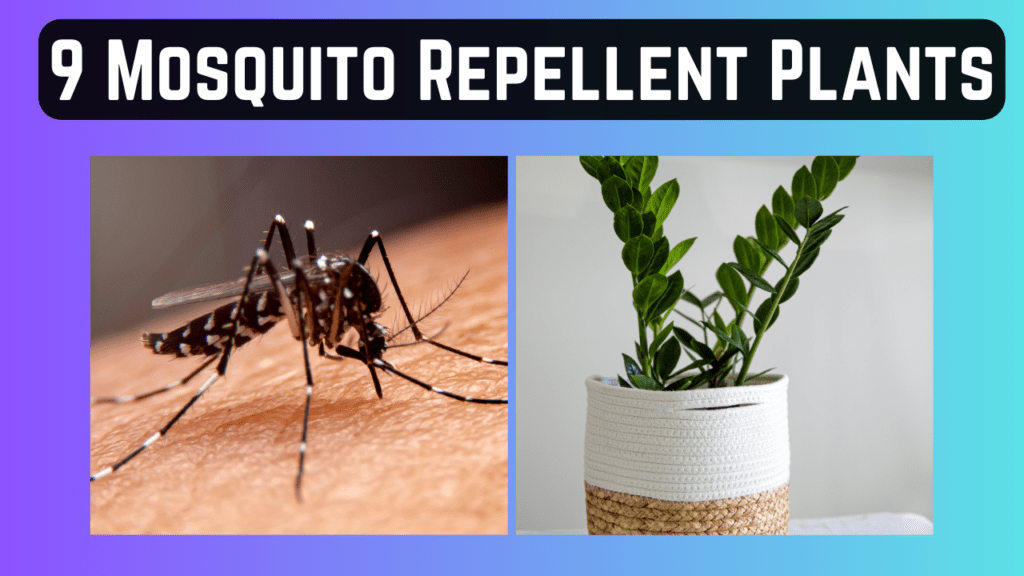
Introduction
Mosquito is the one of the most dangerous and annoying insects in existence It can/potentially transmitted some deadly diseases.
Rather than relying on toxic sprays and smelly lotions, the idea of mosquito repelling plants is environmentally safe and a nontoxic way to take back your enjoyment of the garden. These plants release chemicals mosquitoes find naturally disgusting, and instead your household becomes a healthier place.
What are Mosquito repelling plants & how do they work ?
Mosquito repellent plant has natural compounds and a few oils found in some insect repllents that can make mosquitoes not wan’t to be there. They’re either released in the air or removed to produce sprays or oils. If we understand how it is that they work, then we can use them more efficiently.
Chemical Compounds Found in Plants That Repel Mosquitoes
Some plants are observed to have the chemicals citronellal, eugenol, and nepetalactone as an active elements.
These compounds interfere with the mosquitoes’ sensory receptors, and making it difficult for them to locate humans or the animals.
Citronellal: Citronella and lemongrass are the two plants that includes this compound in addition to its ability to mask scents that will attract the mosquitoes.
Eugenol: A basic ingredient in basil and cloves, it is 40 % resistance against the mosquito. This is also known for its powerful antibacterial properties.
Nepetalactone: A compound in the catnip, it’s proven to be even more effective than DEET in some studies.
Scent-Based Repellents: Why Mosquitoes Avoid Them
Mosquitoes rely heavily on their sense of smell to locate their hosts. The strong aromas from these plants overwhelm their olfactory senses, keeping them away. For example, lavender emits a calming fragrance for humans but acts as a deterrent for mosquitoes.
1. Citronella Grass
How to Grow:
Citronella grass is the most effective natural mosquito repellent plant. It thrives in warm climates (USDA zones 9–11) and they require a full sun and fertile, well-drained soil. So plant it in spring, spacing each plant 18–24 inches apart.
And if you are planting them in a colder regions, then try to grow it in a large containers and bring it indoors during winter, as it cannot tolerate the frost.
Usage:
The plant contains citronella oil, a key ingredient in commercial mosquito repellents. Crush its leaves to release this essential oil and rub it onto your skin for temporary protection; alternatively boil its leaves as natural repellent spray for more permanent results. A living plant provides more effective results than candles or torches which often contain only dilute oil in their formulations.
Care Tips:
Keep the soil consistently moist but not waterlogged. Trim regularly to encourage new growth and prevent it from becoming too bushy. Divide the plant every few years for optimal vigor – as a 5-foot tall plant it makes an excellent natural screen or border plant!
2. Lemongrass
Citronella grass and lemongrass (Cymbopogon citratus) are often used interchangeably, but they are closely related species with similar properties. True lemongrass is used in cooking and also repels mosquitoes due to its high citronella content.
How to Grow:
Lemongrass grows best in full sun and well-drained soil. It can be grown from stalks bought at the grocery store—place the stalk in water until roots form, then plant in soil. Container gardening makes the task even simpler as winter arrives!
Usage:
Use the stalks in cooking (especially Thai and Indian dishes) or make tea. Crushed leaves can be rubbed on skin or used in homemade sprays. The strong lemon scent masks human odors that attract mosquitoes.
Care Tips:
Water regularly and fertilize monthly during the growing season. Harvest outer stalks as needed. In colder zones, treat it as an annual or overwinter indoors.
3. Marigolds
How to Grow:
Marigolds are easy-to-grow annuals which bloom from late spring to frost. They also prefer the full sun and a well-drained soil. Plant the seeds directly in the garden after the last frost or start indoors 4–6 weeks earlier.
Usage:
They contain pyrethrum and thiophenes, these are the natural compounds that repel mosquitoes and other pests like aphids and whiteflies. Plant them near patios, vegetable gardens, or entryways to get maximum effect.
Care Tips:
Deadhead spent flowers to encourage continuous blooming. You must avoid overwatering. They are drought-tolerant once they are planted.
4. Lavender
How to Grow:
Lavender thrives in full sun and well-drained, slightly alkaline soil. It grows in zones 5–11 and is drought-resistant once they are established. Plant in raised beds or containers inorder to to prevent root rot.
Usage:
The essential oil in lavender hinders mosquitoes’ ability to smell. Crush flowers and rub on skin, or use dried buds in sachets. The scent is calming for humans but repels insects.
Care Tips:
Prune annually to maintain shape and prevent woody growth. Avoid wetting the foliage when watering.
5. Catnip (Catmint)
How to Grow:
Catnip is a hardy perennial (zones 3–8) that grows in full sun to partial shade. It spreads quickly, so plant in containers to control growth. Sow seeds in spring or fall.
Usage:
Studies show catnip is ten times more effective than DEET at repelling mosquitoes. Crush leaves to release nepetalactone, the active compound.
Care Tips:
Deadhead to prevent self-seeding. Divide every 2–3 years. Attracts cats, so place strategically.
6. Rosemary
How to Grow:
Rosemary prefers hot, dry climates (zones 7–10) and full sun. It grows well in containers, making it ideal for patios. Use well-drained soil and avoid overwatering.
Usage:
The woody scent repels mosquitoes, cabbage moths, and carrot flies. Toss sprigs on the grill for a smoky repellent effect. Use in cooking or make infused oil.
Care Tips:
Prune regularly to encourage bushiness. Bring indoors in winter in colder zones.
7. Basil
How to Grow:
Basil is an annual that loves warmth, sun, and moist, well-drained soil. Start seeds indoors or plant after frost. Grow in pots or garden beds.
Usage:
The pungent aroma deters mosquitoes and flies. Crush leaves for skin application or make a spray with boiled leaves and water.
Care Tips:
Pinch off flower buds to prolong leaf production. Harvest regularly.
8. Mint
How to Grow:
Mint (zones 3–8) grows in sun to partial shade and moist soil. It spreads aggressively, so plant in containers to prevent takeover.
Usage:
Crush leaves to release menthol, which repels mosquitoes. Use in teas or as a natural air freshener. Safe and non-toxic.
Care Tips:
Trim frequently to encourage growth. Divide every 2–3 years.
9. Scented Geraniums
How to Grow:
Lemon-scented geraniums grow in zones 10–11 or as annuals elsewhere. They need full sun, well-drained soil, and regular pruning. Grow in pots for easy movement.
Usage:
The citrus-like fragrance mimics citronella. Rub crushed leaves on skin for protection. Also deters flies and other insects.
Care Tips:
Water when soil is dry. Fertilize monthly. Bring indoors before frost.
How to Incorporate Mosquito Repellent Plants in Your Home and Garden
Container Gardening vs. Outdoor Planting: For versatility, grow these plants in pots to move them around as needed. Outdoor planting is ideal for creating natural barriers.
Arranging Plants for Maximum Effectiveness: Place these mosquito-repellent plants near your windows, doors, patios, and other high-traffic areas.
Using Plant Oils as DIY Repellents: You can also extract essential oils from these plants to make the sprays or candles for added protection.
Benefits of Using Mosquito Repellent Plants
Eco-Friendly Solution: They reduce the need for chemical repellents that harm the environment.
Health Benefits: Unlike chemical sprays, these plants are non-toxic and safe for pets and children.
Cost-Effective: Once planted, they require minimal investment compared to purchasing repellents regularly.
Also read:
How to Build a Pollinator Garden: 8-Step Guide
Planting Dogwoods? Follow This & Avoid these 5 Blunders
FAQs
1. Do mosquito repellent plants work indoors?
Yes, many of the mosquito-repellent plants including the lavender, basil and rosemary will do well inside homes. To get the most effective results you must spread them around your windows and doors.
2. How often do I need to care for mosquito repellent plants?
Mostly these plants needs very low-maintenance. But most of the types need watering one or two times a week and they also need some occasional pruning.
3. Which mosquito repellent plants grow best in tropical climates?
Some such as lemongrass, citronella and eucalyptus require tropical temperatures to prosper, thriving in heat and sunlight.
4. Can I use these plants to make DIY sprays or oils?
Absolutely! Many of the mosquito-repellent plants can be used to make homemade sprays by extracting their essential oils.
5. Are mosquito repellent plants safe for pets?
While most of them are safe, a few, such as citronella and eucalyptus, could be irritating if you ingest it. And you must keep them away from your pets.
6. How many plants do I need to repel mosquitoes effectively?
The more plants, the better it fills in. A mix of mosquito-repelling plants will help both to make them more effective.

